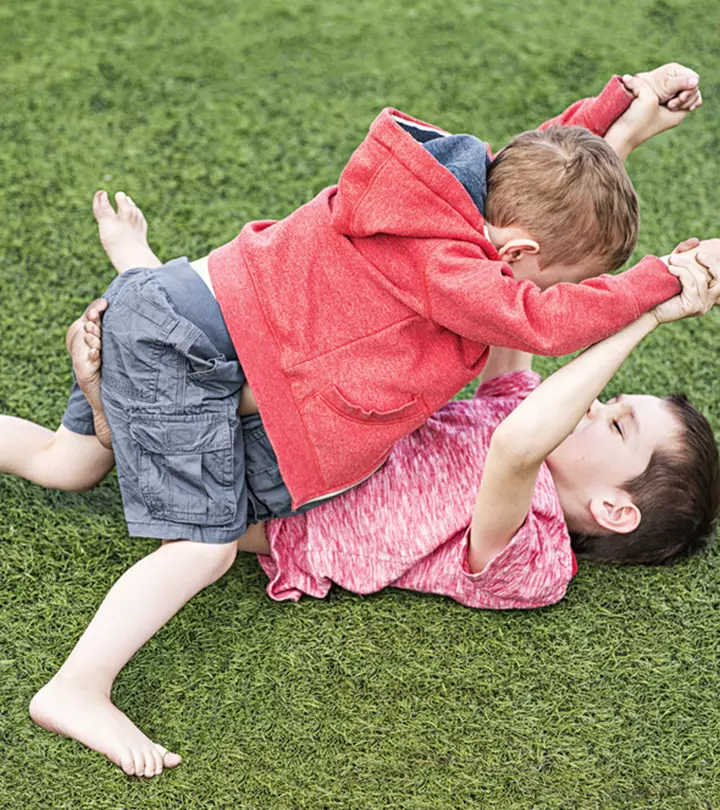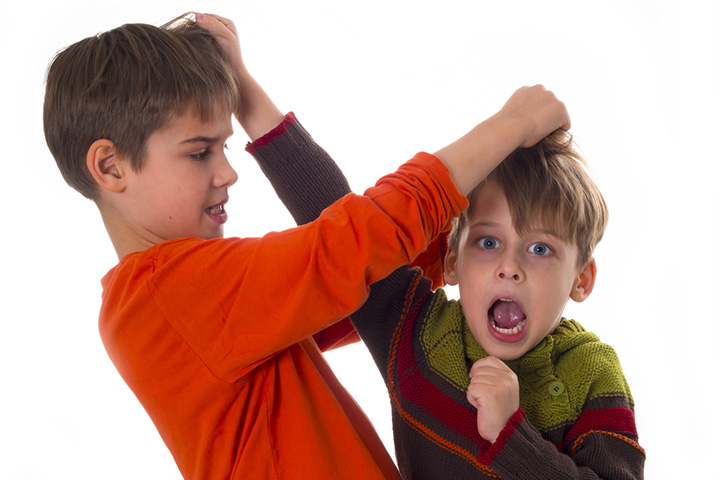
Image: Shutterstock
Coping with a toddler who engages in hitting others can be a demanding aspect of parenting. It’s vital to keep in mind that hitting is a typical behavior for toddlers. Nevertheless, addressing it promptly and efficiently is of utmost importance. In this article, we will delve into the factors contributing to toddler hitting, present practical techniques for curbing this behavior and provide valuable advice for effectively managing this conduct. Read on!
Reasons Behind Toddler Hitting
Image: Shutterstock
Understanding the underlying reasons behind your toddler’s hitting is the first step towards addressing this behavior effectively. Here are some common reasons why toddlers may resort to hitting:
1. They Don’t Understand It’s Bad
Toddlers are still in the process of learning right from wrong. At this age, they might not fully grasp that hitting is unacceptable behavior, and they might not intend to hurt anyone intentionally.
2. Lack Of Impulse Control
Toddlers have limited impulse control compared to older children and adults. When they get frustrated or upset, they may lash out physically as a way to express their emotions.
3. Testing Limits
Hitting can also be a way for toddlers to test boundaries and see how caregivers react. It’s a form of experimentation to understand the consequences of their actions.
How To Stop Toddler From Hitting
Image: Shutterstock
Now that we’ve identified some of the reasons behind toddler hitting, let’s explore effective strategies to stop this behavior:
1. Separate Them From The Person
If your toddler hits someone, separate them from the situation immediately. This not only prevents further harm but also sends a clear message that hitting results in removal from the enjoyable activity.
2. Redirect Them
Instead of simply stopping the behavior, redirect your toddler’s attention towards a more appropriate activity. For example, if they’re hitting a peer, encourage them to play with a different toy or engage in a different game.
3. Name That Feeling
Teach your toddler to recognize and express their emotions verbally. When they’re upset, help them label their feelings, like saying, “I can see you’re really angry right now.” This helps them understand their emotions and find alternative ways to express themselves.
What Not To Do For Toddler Hitting
Image: Shutterstock
While addressing toddler hitting, it’s equally important to know what not to do to avoid exacerbating the situation. Here are some things to avoid:
1. Don’t Try To Reason With Them At The Moment
Toddlers may not be receptive to reasoning when they are upset. Wait until they have calmed down to have a discussion about their behavior and its consequences.
2. Do Not Spank Or Use Physical Punishments
Using physical punishment only reinforces the idea that hitting is an acceptable way to resolve conflicts. It can also lead to feelings of fear and resentment in your child.
3. Don’t Get Overwhelmed By Your Feelings
It’s natural to feel frustrated or upset when your toddler hits, but it’s important to stay calm. Reacting with anger or aggression may escalate the situation and confuse your child.
Tips To Deal With Toddler Hitting
Image: Shutterstock
Here are some additional tips to help you manage and reduce your toddler’s hitting behavior:
1. Find Patterns Or Triggers
Pay attention to when and where your toddler tends to hit. Are there specific triggers or patterns? Identifying these can help you proactively prevent or redirect the behavior.
2. Avoid Violent Media
Limit your child’s exposure to violent television shows, movies, or video games, as they can sometimes influence aggressive behavior.
3. Keep Them Busy And Active
Toddlers have a lot of energy. Engage them in activities that allow them to release energy in a positive way, such as outdoor play or arts and crafts.
4. Be Consistent
Set clear and consistent boundaries for your toddler. Make sure that everyone caring for your child, whether it’s parents, grandparents, or caregivers, follows the same rules and consequences.
5. Ensure Consequences Are Logical
When implementing consequences for hitting, make sure they are logical and related to the behavior. For example, if your toddler hits during playtime, the logical consequence is a brief time-out from that activity.
6. Teach Them Alternate Skills
Help your toddler develop alternative ways to express their emotions or frustrations. Teach them to use words to communicate their feelings, and praise them when they do so effectively.
Navigating the complexities of handling a toddler prone to hitting can indeed pose challenges. Nevertheless, it’s crucial to tackle this situation with a blend of patience, empathy, and unwavering consistency. By delving into the root causes of their behavior, employing effective techniques such as removal and redirection, and steering clear of counterproductive reactions, you can guide your toddler toward better emotional management and communication without resorting to hitting. Keep in mind that each child possesses their unique temperament and needs, so being adaptable in your approach is key. Above all, create a nurturing and supportive environment where your toddler can thrive and acquire essential life skills. Let us know in the comments if you ever had dealt with a toddler hitting and what did you do to improve the situation!
















